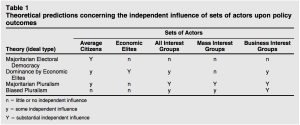Biased Pluralism and the Defense of “Reality” in the Democratic Primary

Last week, I pointed to a problem with Jonathan Chait’s defense of Hillary Clinton’s “pluralistic” approach to governance, noting that in an era of weak labor organization, such an approach leaves out the views of the great majority of working people, precisely the kinds of people Bernie Sanders is attracting.
I didn’t think of it at the time, but since got reminded of an important paper by Martin Gilens and Benjamin Page, released in 2014. It used a dataset matching polling data to policy outcomes to test four theories for how our political system works: Majoritarian Democracy (meaning policies adopted reflect what most people want), Dominance by Economic Elites (meaning the rich get what they want), Majoritarian Pluralism (meaning interest groups, including those that represent the non-wealthy, get what they want), and Biased Pluralism (meaning interest groups that represent the views of the economic elite get what they want).
Ultimately, the paper showed that our system provides what interest groups want, not what the majority want. Importantly, it also noted that the interest groups that have influence don’t actually represent the preferences of the average citizen (which is defined to be policies supported by a median income voter).
But net interest-group stands are not substantially correlated with the preferences of average citizens. Taking all interest groups together, the index of net interest-group alignment correlates only a non-significant .04 with average citizens’ preferences!
It explains this, in part, because there are so many more interest groups (which include corporations) representing the interests of the economic elite that ultimately they’ll guide policy even when including those interest groups representing the interests of the non-elite.
As a result, majoritarian views — what most Americans want — have almost no influence on policy.
The estimated impact of average citizens’ preferences drops precipitously, to a non-significant, near-zero level. Clearly the median citizen or “median voter” at the heart of theories of Majoritarian Electoral Democracy does not do well when put up against economic elites and organized interest groups. The chief predictions of pure theories of Majoritarian Electoral Democracy can be decisively rejected. Not only do ordinary citizens not have uniquely substantial power over policy decisions; they have little or no independent influence on policy at all.
When the majority gets what they want, it is because the elite interest groups favor the same policy, not because anyone is responding to the interests of the average voter.
Finally, the paper further shows that that is even more true when the majority wants change.
A final point: Even in a bivariate, descriptive sense, our evidence indicates that the responsiveness of the U.S. political system when the general public wants government action is severely limited. Because of the impediments to majority rule that were deliberately built into the U.S. political system—federalism, separation of powers, bicameralism—together with further impediments due to anti-majoritarian congressional rules and procedures, the system has a substantial status quo bias. Thus when popular majorities favor the status quo, opposing a given policy change, they are likely to get their way; but when a majority—even a very large majority—of the public favors change, it is not likely to get what it wants.
So it’s one thing if the majority wants things to remain the same, when they might get what they want, but another thing if they’d like to change the status quo, when they almost never will.
I raise all this because it provides an important reminder for this year’s bizarre presidential election. At least on the Democratic side, the findings totally reinforce both candidates. Bernie Sanders is absolutely right that the system is rigged, that the government’s policies don’t reflect the interests of average Americans. But Hillary Clinton is right, too, that the way to get things done in DC — or at least the way that things have gotten done in DC — is to negotiate compromises within the existing interest group structure (which includes a nearly impotent labor movement and overly powerful corporations). She’s even probably right that in the current system you need to co-opt a certain number of economic elite interest groups (that is, largely, corporate groups) to be able to acquire the critical mass of support from interest groups to get a policy adopted. You’ve got to make enough Goldman Sachs speeches to get them to the table, Hillary might excuse her boondoggle speeches.
But that also has certain implications for the policy debate going on. One problem Hillary is having is in needing to champion — to legitimize — the compromises made within that system: notably, Dodd-Frank and Obama’s insurance reform. She’s doing that by suggesting, with the help of wonk-boys like Chait, that the compromises made in those legislative processes were all that were possible at the time. As I hope to lay out, not only the record — but specific actions by those who remain a part of the Hillary entourage — disprove that claim, at least in theory: 2009 was the rare year when that might not have been true. In addition, Hillary’s choice to function within the existing pluralist system also all presumes that the existing set of interest groups, with the nearly impotent labor movement and overly powerful corporations, are a fixed set.
Which brings us back to Bernie’s call for a revolution, which we might think of as providing average people some means of being an interest group again. Whatever else it is, it could become (unlike the Dean organization that became the 50 state strategy and Obama for America that became a messaging organization within a neutered DNC) a resilient interest group. In many ways, it is a more institutionalized and better funded reincarnation of some recent protest groups, with a very strong overlap with Occupy Wall Street, and as such might have staying power, regardless of what happens with the primary.
But that brings us back to the other problem Hillary (as well as the institutional candidates on the Republican side) is having: voters aren’t dummies.
While you can defend the claim that Obama’s insurance reform was all that was possible, that doesn’t mean — even with the many benefits it has brought about — that it was a sound compromise, much less policy that served the interest of the majority or the country as a whole. Similarly, while you can claim (even more dubiously) that foaming the runway to give the banks a soft landing was necessary, real Americans know we all would be better off with Lloyd Blankfein in prison. That is, you can claim that interest group policies are all we can get, but at that same time that means that interest group policies don’t self-evidently serve the interests of Americans. Hillary can’t admit that, but that’s the truth confirmed in Gilens and Page. It’s also the reason why the wonk-boys are working so hard to claim that these policies serve the good of most people, to try to refute the obvious ways they don’t.
Hillary may well win (the primary, at least) based on truthfully claiming she represents the continuation of Obama’s policies, as Greg Sargent argued yesterday.
Beyond this, the big picture here is that Sanders has gotten as far as he has by offering up a serious, if partial, indictment of the Obama years. He is arguing that Obama era reforms — Dodd-Frank, Obamacare, his climate agenda — ended up being woefully inadequate to the scale of our challenges, because he failed to sufficiently rally the grassroots against the power of the oligarchy and because the Democratic establishment still remains in thrall to oligarchic money. Clinton full-throatedly defends Obama’s accomplishments as very much worth preserving, rejects the Sanders-promulgated notion that Obama could have gotten a whole lot more than he did, and vows to build on those achievements.
The bigger, more diverse, more moderate electorates in the contests to come might be more receptive to Clinton’s arguments along these lines. And one thing to watch will be whether Sanders tries to find a way to temper the criticism of the Obama years that is laced through the story he is telling.
I’d temper that and note that Bernie is probably closer to the real foreign policy successes of Obama’s post-Hillary term, including opening relations with Iran and Cuba and demanding that the Saudis actually start fighting ISIL. But on the Obama policies that are most obviously the result of letting interest groups, from the impotent labor movement to the overly powerful corporations, direct policy, Hillary is the inheritor of a historically fairly popular legacy. That’s true, and it may well be enough, barring any unforeseen economic reversals, though economic reversals are actually looking pretty likely, in which case that legacy may be of far less value.
The problem with being in that very advantageous position is that, especially this year, voters are all too aware that those policies didn’t necessarily serve their needs. And that, it seems, explains the disjuncture between Hillary’s claim (true or not) to best be able to negotiate the interest groups of DC and the fact that that hasn’t been enough to convince voters.

